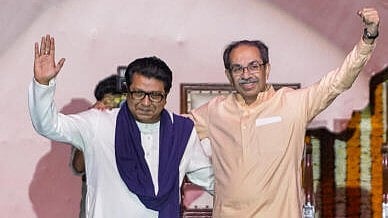
Maharashtra Navnirman Sena (MNS) chief Raj Thackeray, left, and Shiv Sena (UBT) chief Uddhav Thackeray during a joint victory rally.
Credit: PTI Photo
The coming together of the two Thackeray cousins – Uddhav and Raj – after a 20-year estrangement brings a new dimension to politics in Maharashtra. The state has seen many similar unions, and partings, in the last few years, and almost every one of them was about political ambition, personality clashes or power.
Uddhav Thackeray who heads the Shiv Sena (UBT) faction, and Raj Thackeray, the Maharashtra Navnirman Sena (MNS) chief, shared the stage at a rally in Mumbai on Saturday in a show of unity.
They called it a ‘victory’ rally as it came days after the BJP-led state government made a U-turn on the introduction of Hindi as the third language. While Uddhav proclaimed brotherhood, Raj said Maharashtra was bigger for him than “personal differences” – the latter parted ways with the Shiv Sena in 2005, after its founder Bal Thackeray anointed son Uddhav as his successor. Raj formed the MNS which has not made much political impact.
Though Uddhav is seen to have hinted at the possibility of an alliance with the MNS for the upcoming local body election, Raj has not been clear on the matter.
The Shiv Sena (UBT) has struggled after the Eknath Shinde faction – now recognised as the Shiv Sena – did well in the last Assembly polls.
The MNS is in a much worse position, with its candidates losing their deposits in most of the seats it contested and managing just over 1% votes. It has also been known for violent conduct; their activists beat up non-Marathi traders and vandalised offices during the recent anti-Hindi agitation.
Even if the two parties come together on an aggressive Marathi manoos platform, it may not have a big political impact.
Unity or even an alliance between the UBT and the MNS may create complications in the Opposition Mahavikas Aghadi (MVA). The Congress, MVA’s largest constituent, is not comfortable with Raj Thackeray and has expressed reservations about working with his party.
Both alliances are grappling with internal differences and the state is likely to see a shift in its political narratives. The ensuing local body polls will present a test for parties and alliances. The prestigious Mumbai civic elections will pose a serious challenge to the UBT and the MNS.
It is to be seen whether the two will contest the election without support from the Congress and the NCP led by Sharad Pawar. What is certain is that the Thackeray reunion has added uncertainty to Maharashtra’s badly fragmented political landscape.
